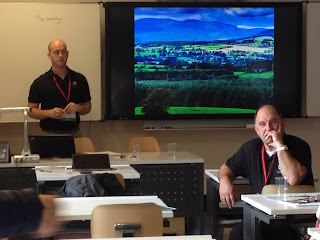 Over 300 delegates from across Europe
attended the recent EUROPARC Federation Conference in the Vallée de Joux located
in the Parc Jura Vaudois, Switzerland. Regarded as the birthplace of Swiss
horology, the Vallée de Joux is still the home to a number of famous Swiss
mechanical watch manufacturers while remaining very much a rural area. The
EUROPARC Federation serves as a network for Europe’s natural and cultural heritage
and aims to improve the management of Protected Areas across Europe through
international cooperation, the exchange of ideas and experience and by
influencing policy.
Over 300 delegates from across Europe
attended the recent EUROPARC Federation Conference in the Vallée de Joux located
in the Parc Jura Vaudois, Switzerland. Regarded as the birthplace of Swiss
horology, the Vallée de Joux is still the home to a number of famous Swiss
mechanical watch manufacturers while remaining very much a rural area. The
EUROPARC Federation serves as a network for Europe’s natural and cultural heritage
and aims to improve the management of Protected Areas across Europe through
international cooperation, the exchange of ideas and experience and by
influencing policy.
The annual conference, comprising a series
of talks, workshops and fieldtrips, is the largest gathering of park
professionals in Europe. This year’s conference theme ‘We are the Parks’
focused on the role that people play in the creation and management of
protected areas and aimed to highlight how local communities can participate in
the governance of parks. Governance of protected areas was the key theme of the
conference with keynote speakers discussing the Swiss democratic model of parks
and their ‘bottom-up’ model of park management, an approach that Wicklow
Uplands Council takes in all their work.
 A small delegation from Wicklow Uplands
Council attended the conference and had the very exciting opportunity of
hosting a workshop titled ‘We are Sustainable Farmers’. The four hour workshop
was attended by a number of important delegates including the Project Manager
for Biodiversity and Ecosystems in the European Environment Agency, members of
the EUROPARC Council and representatives from protected areas across Europe.
The workshop presented by Wicklow Uplands Council Acting Co-ordinator, Brian
Dunne, discussed the needs of farmers, local communities and recreational users
in relation to their protected areas. The importance of cooperation and
communication between all stakeholder groups was discussed at length and the
partnership model undertaken by Wicklow Uplands Council was seen as a model
template by those present. It was agreed
by all that farmers have an important role to play in the best management of
protected areas and that farmers need to have more involvement in the decision-
making processes related to them.
A small delegation from Wicklow Uplands
Council attended the conference and had the very exciting opportunity of
hosting a workshop titled ‘We are Sustainable Farmers’. The four hour workshop
was attended by a number of important delegates including the Project Manager
for Biodiversity and Ecosystems in the European Environment Agency, members of
the EUROPARC Council and representatives from protected areas across Europe.
The workshop presented by Wicklow Uplands Council Acting Co-ordinator, Brian
Dunne, discussed the needs of farmers, local communities and recreational users
in relation to their protected areas. The importance of cooperation and
communication between all stakeholder groups was discussed at length and the
partnership model undertaken by Wicklow Uplands Council was seen as a model
template by those present. It was agreed
by all that farmers have an important role to play in the best management of
protected areas and that farmers need to have more involvement in the decision-
making processes related to them. The decline in traditional hill farming
coupled with the ongoing restrictions to effective habitat management of upland
areas has resulted in an overall decline in upland biodiversity. The need for a
Locally Led Agri-Environment Scheme to support our upland farmers was presented
as a case study and was welcomed as ‘a very exciting development’ by the
participants. It was also agreed that more awareness was needed in relation to
the wide range of ecosystem services provided by upland farming. A second case
study was presented at the workshop by Sirje Kuusik from Estonia representing
the sustainable tourism network, ‘Genuine Experiences in Lahemaa’. This group
of seventeen family based tourism farms has successfully added value to their
products by branding them to their national park and are now running very
successful farm-based tourism businesses.
The decline in traditional hill farming
coupled with the ongoing restrictions to effective habitat management of upland
areas has resulted in an overall decline in upland biodiversity. The need for a
Locally Led Agri-Environment Scheme to support our upland farmers was presented
as a case study and was welcomed as ‘a very exciting development’ by the
participants. It was also agreed that more awareness was needed in relation to
the wide range of ecosystem services provided by upland farming. A second case
study was presented at the workshop by Sirje Kuusik from Estonia representing
the sustainable tourism network, ‘Genuine Experiences in Lahemaa’. This group
of seventeen family based tourism farms has successfully added value to their
products by branding them to their national park and are now running very
successful farm-based tourism businesses.
Wicklow
Upland Council’s membership of the Federation represents something of a hybrid
within the organisation which has almost 400 members, most of whom own or
manage Protected Areas across Europe and therefore it was very significant that
we were invited to host a workshop this year. It is
very important that we network with our European counterparts, share
experiences and continue to learn from each other. Full details on the
conference can be found at www.europarc.org.
ENDS Brian Dunne Acting Co-ordinator
Wicklow Uplands Council

No comments:
Post a Comment